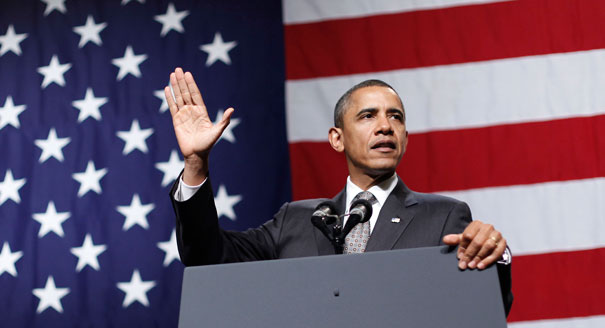Ross Douthat wrote a very good piece on the two U.S. narratives that have vied with each other for the last thirty-five years.
The liberal narrative (with President Obama functioning as story-teller in chief) runs like this:
“That’s not who we are.” So said President Obama, again and again throughout his administration, in speeches urging Americans to side with him against the various outrages perpetrated by Republicans. And now so say countless liberals, urging their fellow Americans to reject the exclusionary policies and America-first posturing of President Donald Trump.
The problem with this rhetorical line is that it implicitly undercuts itself. If close to half of America voted for Republicans in the Obama years and support Trump today, then clearly something besides the pieties of cosmopolitan liberalism is very much a part of who we are.
. . . In this narrative, which has surged to the fore in response to Trump’s refugee and visa policies, we are a propositional nation bound together by ideas rather than any specific cultural traditions — a nation of immigrants drawn to Ellis Island, a nation of minorities claiming rights too long denied, a universal nation destined to welcome foreigners and defend liberty abroad.
Given this story’s premises, saying that’s not who we are is a way of saying that all more particularist understandings of Americanism, all non-universalist forms of patriotic memory, need to be transcended. Thus our national religion isn’t anything specific, but we know it’s not-Protestant and not-Judeo-Christian. Our national culture is not-Anglo-Saxon, not-European; the prototypical American is not-white, not-male, not-heterosexual. We don’t know what the American future is, but we know it’s not-the-past.
Then there’s the conservative narrative (with Trump adding Jacksonian democratic accents):
But the real American past was particularist as well as universalist. Our founders built a new order atop specifically European intellectual traditions. Our immigrants joined a settler culture, Anglo-Saxon and Protestant, that demanded assimilation to its norms. Our crisis of the house divided was a Christian civil war. Our great national drama was a westward expansion that conquered a native population rather than coexisting with it.
As late as the 1960s, liberalism as well as conservatism identified with these particularisms, and with a national narrative that honored and included them. The exhortations of civil rights activists assumed a Christian moral consensus. Liberal intellectuals linked the New Deal and the Great Society to Thomas Jefferson and Andrew Jackson. Pop-culture utopians projected “Wagon Train” into the future as “Star Trek.”. . .
But meanwhile for a great many Americans the older narrative still feels like the real history. They still see themselves more as settlers than as immigrants, identifying with the Pilgrims and the Founders, with Lewis and Clark and Davy Crockett and Laura Ingalls Wilder. They still embrace the Iliadic mythos that grew up around the Civil War, prefer the melting pot to multiculturalism, assume a Judeo-Christian civil religion rather the “spiritual but not religious” version.
Douthat wonders if one narrative is any longer possible.
But any leader who wants to bury Trumpism (as opposed to just beating Trump) would need to reach for one — for a story about who we are and were, not just what we’re not, that the people who still believe in yesterday’s American story can recognize as their own.
What he observes though is a truth about liberal progressive narratives that we also see in mainline Protestantism — historical denial (read fake history). The PCUSA can’t talk about the days it opposed Arminianism, refused to ordain women, and possessed Princeton Theological Seminary as its chief intellectual jewel. No mainline Presbyterian today recognizes the names of William Adams Brown, Robert Speer, or Harry Emerson Fosdick. Why? Because they were not who contemporary Presbyterians are. They don’t measure up to the present.
The same goes for political progressives. They have no useful past in the actual institutions of national life because old Americans are not contemporary Americans. It is what it is becomes we are who we are. We have no capacity to say “we are who we were” even in part.
If that’s so, let’s not simply ban the confederate flag. Let’s burn the U.S. flag — what a racist, misogynist, heterosexist, capitalist country. How dare President Obama wear a flag lapel pin.
Even better — let’s move to Mars where we can reboot the human race.


